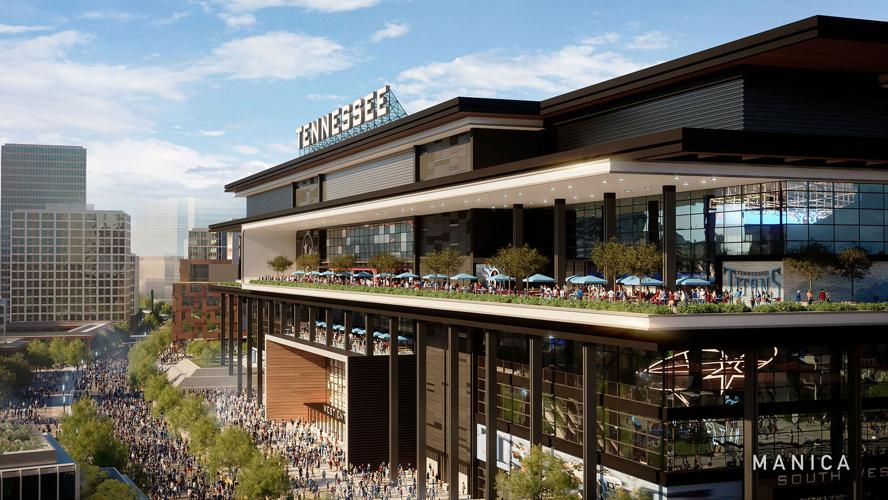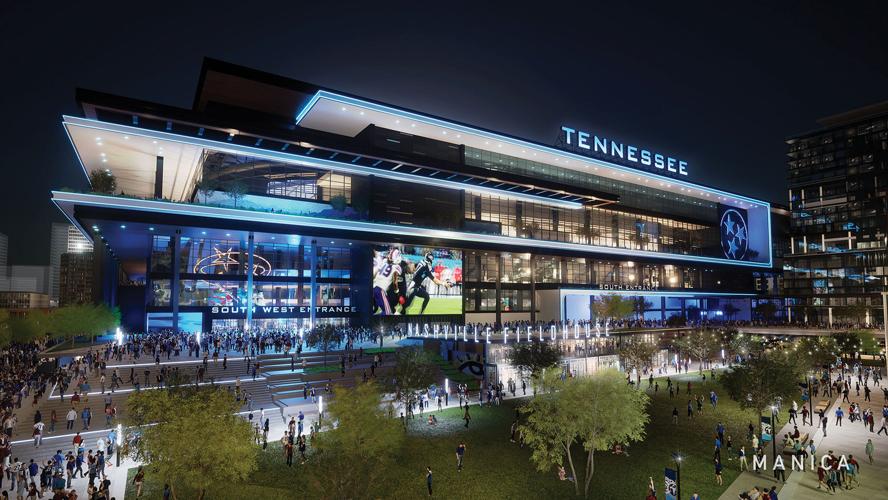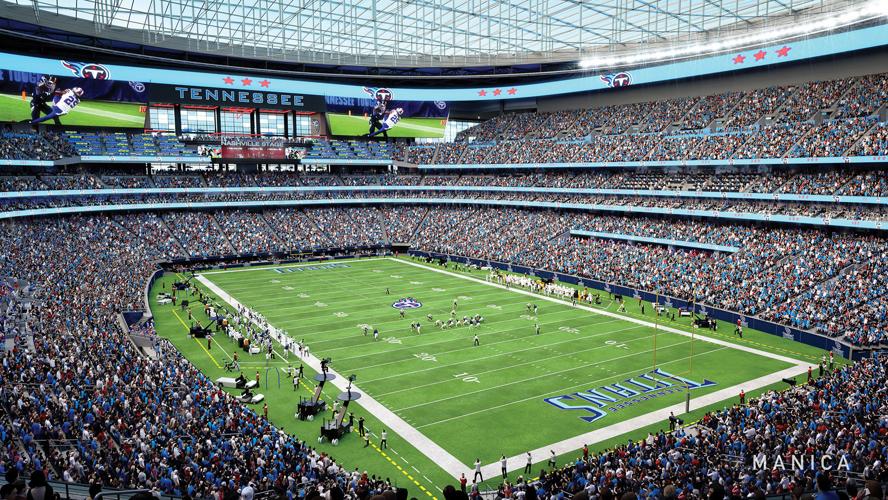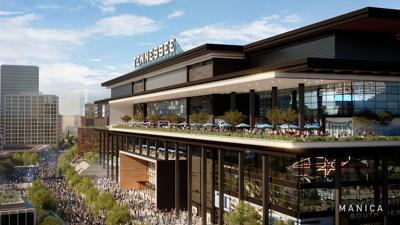The city has agreed to move forward with a new $2.1 billion domed stadium. It will host the Tennessee Titans’ eight annual home games and bait big-ticket events, namely a Super Bowl and NCAA Final Four games.
The city will contribute $760 million to stadium costs, and the state will chip in $500 million. Costs to develop the surrounding 300 acres — currently an industrial floodplain between East Nashville and downtown — into a stadium district will likely approach another $1 billion. Boosters praise the deal for freeing the city from potentially costly liabilities exposed in the current lease signed in 1996 and launching the city even higher into the entertainment stratosphere. Critics call it a historically lavish giveaway of public funds to another billion-dollar corporation, a painful symbol of city leaders’ upside-down loyalty to downtown tourism dollars instead of pressing city needs like housing and transit.
Timeline
Then-Mayor Phil Bredesen aggressively courted the Houston Oilers, signing a lease in 1996 that favored the team and locked Nashville into a long-term agreement that required the city to keep its stadium in “first class condition.” Three years later, Kevin Dyson went down at the 1-yard line — the Titans lost the Super Bowl, but they started winning the city, which got a taste of the national spotlight long before the bachelorettes and James Beard nominations arrived. Adelphia Coliseum became the Coliseum, then LP Field and finally Nissan Stadium.
The Tennessean ran a Sunday cover story on Jan. 2, 2022, headlined: “Nashville’s next chapter is being written on the banks of the Cumberland.” The angle seemed to come out of nowhere, a booster piece by and for real estate circles desperate for the next land bonanza. In February, Axios’ Nate Rau broke the story about discussions on a new stadium. Mayor John Cooper’s former scheduler said Cooper had been meeting with the team weekly for a year about next steps for the stadium.
Last spring, Cooper floated pursuing a new stadium rather than renovating Nissan, matching his talking points to The Tennessean’s lede — “Nashville’s Next Great Neighborhood” became the tagline for a campus that would feature all manner of revamped commercial and residential space, including but not limited to a domed stadium. Cooper put $2.2 billion in June’s Capital Improvements Budget. The Metro Council set up its own oversight body, the East Bank Stadium Committee, to probe the terms of what would be the largest-ever amount of public money for the second-most-expensive stadium in the world.
Legislation came through the council in bits and pieces. The council bickered, at times confused by proposed Nissan Stadium renovations that were supposed to cost only $300 million now ballooning into the billions. Critics wanted the city to do its own due diligence rather than rely on the Titans’ numbers. Supporters pointed to the glossy stadium renderings and maintenance bills still overdue from the 1996 lease.

Titans stadium rendering
Money in the Bank
Today the East Bank is an industrial wasteland. Last year, Metro’s Planning Department started rolling out new slideshows advertising a revamped downtown corridor. The city will pay for new infrastructure like streetscape, sewer and water, working with one or more as-yet-unknown private developers to build a stadium district with two purposes: raise a live-work-play environment profitable to its developers, and create a sales tax base to repay stadium debt. It will cost a lot of general fund money over a long period of time — money that is necessary for (but not captured by) the stadium’s $2.1 billion price tag.
“A quarter of every [Capital Spending Plan] until 2030!” a Metro source told the Scene recently, referencing the city’s intermittent plans that budget spending for things like road improvements, school renovations and new fire engines. The actual costs of overhauling the area have not been finalized. Expect a five-year construction zone à la Amazon’s Nashville Yards.
The Numbers
Tennessee’s $500 million contribution came in with the straightforward stipulation that it be used only for a domed stadium. Add to that $840 million from the team, which will cover cost overruns. The rest is a thick braid of tax revenue backing Nashville’s $760 million: all sales tax revenue collected in the stadium and half collected in the surrounding 130 acres, plus an additional 1 percent to the hotel occupancy tax collected countywide. These streams include local option sales taxes that would otherwise go to the city’s general fund. Proponents argue that, without the stadium, there wouldn’t be money coming in anyway, so why not pledge future tax revenue, similar to the logic behind tax increment financing (TIF) projects. No one knows how much these streams will generate each year. The city’s money people, like bond counsel Jeff Oldham and finance director Kelly Flannery, will assure lenders that it’s enough to cover payments for $760 million in new bond debt.

Titans stadium rendering
Popular Reactions
Many councilmembers saw the deal as a preferable escape route from an embarrassing and potentially expensive legal quandary. In her blog, District 26’s Courtney Johnston praises the new deal for allowing the city to wiggle from a general fund liability into one backed by tax revenues. Councilmember At-Large Bob Mendes continues to criticize the administration for not sufficiently exploring alternatives (specifically for neglecting to get its own renovation estimate). He characterizes the deal as an open-ended money pit that will financially short-circuit, forcing the city to sign away more in public money than the stadium will ever return. As legislation moved through the council, members in both camps shared the same frustration: Deal negotiations happened privately and arrived at the council with a sense of urgency that chilled debate and minimized the body’s role in a significant decision for the city.
Kickoff
The council passed the official “intergovernmental project agreement” at a special meeting on April 25 (which, after much public comment from community members, stretched into the early-morning hours of April 26). The vote cut against objections by local housing and economic justice groups, who called on members to slow the deal and examine the city’s priorities. A Vanderbilt University poll showed that most residents oppose a new stadium, and some mayoral candidates are already campaigning against it.
Expect the project to break ground in 2024 and finish in time for the Titans’ 2027 season opener. Expect even more cranes.








